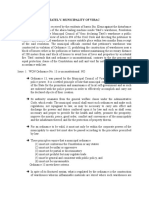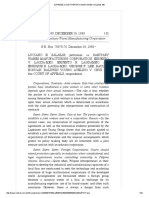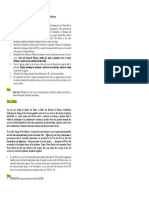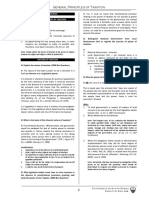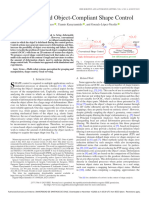12 REPUBLIC v. PARANAQUE
12 REPUBLIC v. PARANAQUE
Uploaded by
TriciaCopyright:
Available Formats
12 REPUBLIC v. PARANAQUE
12 REPUBLIC v. PARANAQUE
Uploaded by
TriciaOriginal Description:
Copyright
Available Formats
Share this document
Did you find this document useful?
Is this content inappropriate?
Copyright:
Available Formats
12 REPUBLIC v. PARANAQUE
12 REPUBLIC v. PARANAQUE
Uploaded by
TriciaCopyright:
Available Formats
#12 REPUBLIC v.
CITY OF PARANAQUE
G.R. No. 191109,
July 18, 2012
FACTS:
The Public Estates Authority (PEA) is a government corporation created by virtue of PD 1084 (Creating the Public
Estates Authority, Defining its Powers and Functions, Providing Funds Therefor and For Other Purposes) which took
effect on February 4, 1977 to provide a coordinated, economical and efficient reclamation of lands, and the
administration and operation of lands belonging to, managed and/or operated by, the government with the object of
maximizing their utilization and hastening their development consistent with public interest. On February 14, 1979, by
virtue of (E.O.) No. 525 issued by then President Ferdinand Marcos, PEA was designated as the agency primarily
responsible for integrating, directing and coordinating all reclamation projects for and on behalf of the National
Government. On 2004 President Gloria Macapagal-Arroyo issued E.O.No. 380 transforming PEA into PRA, which
shall perform all the powers and functions of the PEA relating to reclamation activities. By virtue of its mandate, PRA
reclaimed several portions of the foreshore and offshore areas of Manila Bay, including those located in Parañaque
City.
On February 19, 2003, then Parañaque City Treasurer Liberato M. Carabeo (Carabeo) issued Warrants of Levy on
PRA’s reclaimed properties (Central Business Park and Barangay San Dionisio) located in Parañaque City based on
the assessment for delinquent real property taxes made by then Parañaque City Assessor Soledad Medina Cue for tax
years 2001 and 2002. PRA filed a petition for prohibition with prayer for temporary restraining order (TRO) and/or
writ of preliminary injunction against Carabeo before the RTC. After due hearing, the RTC issued an order denying
PRA’s petition for the issuance of a TRO. The RTC rendered its decision dismissing PRA’s petition ruling that PRA
was not exempt from payment of real property taxes, because it was a GOCC under PD 1084. Not in conformity, PRA
filed this petition for certiorari assailing the RTC Order stating that petitioner is an incorporated instrumentality of the
national government and is, therefore, exempt from payment of real property tax and that the trial court gravely erred
in failing to consider that reclaimed lands are part of the public domain and, hence, exempt from real property tax.
ISSUE: Whether PRA is an incorporated instrumentality of the National government and is therefore, exempt from
payment of real property tax under Sections 234 (a) and 133 (a) of RA 7160?
HELD: Yes. It is a Government Instrumentality.
A GOCC must be "organized as a stock or non-stock corporation” while an instrumentality is vested by law with
corporate powers. Likewise, when the law makes a government instrumentality operationally autonomous, the
instrumentality remains part of the National Government machinery although not integrated with the department
framework. When the law vests in a government instrumentality corporate powers, the instrumentality does not
necessarily become a corporation. Unless the government instrumentality is organized as a stock or non-stock
corporation, it remains a government instrumentality exercising not only governmental but also corporate powers.
Many government instrumentalities are vested with corporate powers but they do not become stock or non-stock
corporations, which is a necessary condition before an agency or instrumentality is deemed a GOCC.
It is clear from Section 234 that real property owned by the Republic of the Philippines (the Republic) is exempt from
real property tax unless the beneficial use thereof has been granted to a taxable person. In this case, there is no proof
that PRA granted the beneficial use of the subject reclaimed lands to a taxable entity. There is no showing on record
either that PRA leased the subject reclaimed properties to a private taxable entity.
The Court agrees with PRA that the subject reclaimed lands are still part of the public domain, owned by the State
and, therefore, exempt from payment of real estate taxes.
1|Page
You might also like
- Saep 17Document31 pagesSaep 17OMER ELFADIL100% (1)
- Republic of The Philippines Represented by The Philippine Reclamation Authority (PRA) Vs City of Paranaque 677 SCRA 246Document4 pagesRepublic of The Philippines Represented by The Philippine Reclamation Authority (PRA) Vs City of Paranaque 677 SCRA 246Khian JamerNo ratings yet
- Doctrine of AbsorptionDocument1 pageDoctrine of AbsorptionTriciaNo ratings yet
- Able SeamanDocument2 pagesAble Seamansnhz555No ratings yet
- Salvanera v. PeopleDocument3 pagesSalvanera v. PeopleAnonChieNo ratings yet
- Pub Corp CasesDocument5 pagesPub Corp CasesJaime PinuguNo ratings yet
- 2.3. Lopez Vs LiboroDocument3 pages2.3. Lopez Vs Liborovalkyrior100% (1)
- Director of Lands v. The Roman Catholic Church of Zamboanga, The Municipality of MisamisDocument2 pagesDirector of Lands v. The Roman Catholic Church of Zamboanga, The Municipality of MisamisBruce WayneNo ratings yet
- G.R. No. 170912Document12 pagesG.R. No. 170912Rene Valentos100% (1)
- JH Ankron Vs Government of The Phil Islands CASE DIGESTsDocument2 pagesJH Ankron Vs Government of The Phil Islands CASE DIGESTsVertine Paul Fernandez Beler0% (1)
- Naldtra vs. CSCDocument1 pageNaldtra vs. CSCBennet GubatNo ratings yet
- Case Digests ACEDocument42 pagesCase Digests ACEamikaeylaNo ratings yet
- Cruz Vs Denr Separate OpinionsDocument7 pagesCruz Vs Denr Separate OpinionsCzarina AureNo ratings yet
- EDCA Vs SantosDocument7 pagesEDCA Vs SantosGladys BantilanNo ratings yet
- Specpro Rule 102Document16 pagesSpecpro Rule 102ana loNo ratings yet
- Lopez Vs Valdez, 32 Phil 644Document2 pagesLopez Vs Valdez, 32 Phil 644flornatsNo ratings yet
- Lopez RealtyDocument2 pagesLopez RealtyRaymart SalamidaNo ratings yet
- Ortega v. Valmonte, G.R. No. 157451, (December 16, 2005), 514 PHIL 436-453)Document14 pagesOrtega v. Valmonte, G.R. No. 157451, (December 16, 2005), 514 PHIL 436-453)yasuren2No ratings yet
- Cebu Oxygen vs. BercillesDocument2 pagesCebu Oxygen vs. BercillesWinter WoodsNo ratings yet
- Inchausti Vs CromwellDocument5 pagesInchausti Vs CromwellAnonymous hbUJnBNo ratings yet
- 06 Treasurer of The Philippines V CADocument2 pages06 Treasurer of The Philippines V CANichole LanuzaNo ratings yet
- I. INTRODUCTION - Concepts and Principles A. Public Office and Public Officers 1) DefinitionsDocument10 pagesI. INTRODUCTION - Concepts and Principles A. Public Office and Public Officers 1) DefinitionsLara Michelle Sanday BinudinNo ratings yet
- Fahrenbach Vs Pangilinan, GR 224549, August 7, 2017 Case Digest - Javellana, LuckyDocument2 pagesFahrenbach Vs Pangilinan, GR 224549, August 7, 2017 Case Digest - Javellana, LuckyLucky JavellanaNo ratings yet
- Ayala Corporation Vs Ray Burton Development CorporationDocument2 pagesAyala Corporation Vs Ray Burton Development CorporationDannielle Anne CaliosanNo ratings yet
- DBT Mar BayDocument2 pagesDBT Mar BayJoannaNo ratings yet
- UP 2010 Civil Law Credit TransactionsDocument34 pagesUP 2010 Civil Law Credit Transactionsjezzel brendiaNo ratings yet
- GNotes Income Tax 100814 Part1Document42 pagesGNotes Income Tax 100814 Part1Migz DimayacyacNo ratings yet
- Director of Lands v. CFI - CASEDIGEST - 135SCRA392Document2 pagesDirector of Lands v. CFI - CASEDIGEST - 135SCRA392Angel UrbanoNo ratings yet
- Secretary of DENR Vs YAPDocument6 pagesSecretary of DENR Vs YAPmichelleannruizcpaNo ratings yet
- DBP Vs RD of Nueva EcijaDocument11 pagesDBP Vs RD of Nueva EcijaSachuzenNo ratings yet
- 5yr Prog Case Digests PDFDocument346 pages5yr Prog Case Digests PDFMary Neil GalvisoNo ratings yet
- Government V Philippine Steamship Co., Inc.Document5 pagesGovernment V Philippine Steamship Co., Inc.Cathy BelgiraNo ratings yet
- Medalla V SayoDocument4 pagesMedalla V SayoKyle JamiliNo ratings yet
- Chapter 3Document15 pagesChapter 3Carlos JamesNo ratings yet
- James R. Jackson, Individually and As Administrator of The Estate of Sandra A. Jackson v. City of Joliet, 465 U.S. 1049 (1984)Document2 pagesJames R. Jackson, Individually and As Administrator of The Estate of Sandra A. Jackson v. City of Joliet, 465 U.S. 1049 (1984)Scribd Government DocsNo ratings yet
- Sesbreno v. Court of Appeals: JuristDocument4 pagesSesbreno v. Court of Appeals: JuristSean Denzel OmliNo ratings yet
- RA 8249 - Further Defining The Jurisdiction of The Sandiganbayan EtcDocument6 pagesRA 8249 - Further Defining The Jurisdiction of The Sandiganbayan EtcCrislene CruzNo ratings yet
- Loanzon - The Duty of Upholding The Integrity of The Legal P A6ljz8nDocument134 pagesLoanzon - The Duty of Upholding The Integrity of The Legal P A6ljz8nReygie P. LopezNo ratings yet
- CIR V La Flor Dela IsabelaDocument9 pagesCIR V La Flor Dela Isabelasteth16No ratings yet
- Fort Bonifacio V CirDocument4 pagesFort Bonifacio V CirJasNo ratings yet
- Bandillon V LFUC - CorpinDocument3 pagesBandillon V LFUC - CorpinAndrew GallardoNo ratings yet
- Republic V KenrickDocument4 pagesRepublic V KenrickIvan Montealegre ConchasNo ratings yet
- 124069-1998-Casabuena v. Court of Appeals20211020-12-1ganzieDocument6 pages124069-1998-Casabuena v. Court of Appeals20211020-12-1ganzieDAISY REE JANE LUPASENo ratings yet
- Case Cebu United Enterprises v. Gallofin, 106 Phil 491 (1959)Document6 pagesCase Cebu United Enterprises v. Gallofin, 106 Phil 491 (1959)Clarice Joy SjNo ratings yet
- Margaret Jane RadinDocument32 pagesMargaret Jane Radinthornapple25No ratings yet
- Credit Transactions: Final ExamDocument1 pageCredit Transactions: Final ExamMayette Belgica-ClederaNo ratings yet
- 138 Pardo v. Hercules Lumber Co. and Ferrer (Castro)Document1 page138 Pardo v. Hercules Lumber Co. and Ferrer (Castro)AlexandraSoledadNo ratings yet
- 09 Aurbach vs. Sanitary Wares Manufacturing CorporationDocument22 pages09 Aurbach vs. Sanitary Wares Manufacturing CorporationYaz CarlomanNo ratings yet
- Tayag vs. Benguet ConsolidatedDocument17 pagesTayag vs. Benguet ConsolidatedisaaabelrfNo ratings yet
- Arada v. CA, G.R. No. 98243. July 1, 1992Document8 pagesArada v. CA, G.R. No. 98243. July 1, 1992Melle EscaroNo ratings yet
- 3 PAL vs. EDU DigestDocument3 pages3 PAL vs. EDU DigestJeanne CalalinNo ratings yet
- Specpro OutlineDocument10 pagesSpecpro OutlinePrinz Hernan BautistaNo ratings yet
- Paloma vs. MoraDocument1 pagePaloma vs. MoraKenneth Ray TagleNo ratings yet
- Golden Farms vs. CallejaDocument3 pagesGolden Farms vs. CallejaKimberly SendinNo ratings yet
- Agcaoili LTD PDFDocument32 pagesAgcaoili LTD PDFruss8dikoNo ratings yet
- Negotiable Instruments LawDocument3 pagesNegotiable Instruments LawErin GamerNo ratings yet
- Property Title I and IIDocument19 pagesProperty Title I and IIXyvie Dianne D. Daradar100% (1)
- 2.10 San Miguel Foods Vs SMC Supervisors and Exempt Union (2011)Document11 pages2.10 San Miguel Foods Vs SMC Supervisors and Exempt Union (2011)Axel ChowNo ratings yet
- Taxation PDFDocument300 pagesTaxation PDFroy rebosuraNo ratings yet
- Civ - de Los Angeles - LTD 5Document8 pagesCiv - de Los Angeles - LTD 5Lirio IringanNo ratings yet
- Republic v. Paranaque DigestedDocument4 pagesRepublic v. Paranaque DigestedChariNo ratings yet
- Republic of The Philippines, Represented by The Philippine Reclamation Authority (Pra) vs. City of ParanaqueDocument2 pagesRepublic of The Philippines, Represented by The Philippine Reclamation Authority (Pra) vs. City of Paranaquefranzadon100% (1)
- 5.de Borja Vs de BorjaDocument1 page5.de Borja Vs de BorjaTriciaNo ratings yet
- Reyes V CADocument1 pageReyes V CATriciaNo ratings yet
- Guinto V MedinaDocument1 pageGuinto V MedinaTriciaNo ratings yet
- Pascual V Dela CruzDocument5 pagesPascual V Dela CruzTriciaNo ratings yet
- Morisono V LCR, QCDocument1 pageMorisono V LCR, QCTriciaNo ratings yet
- EDocument2 pagesETriciaNo ratings yet
- ATLAsDocument1 pageATLAsTriciaNo ratings yet
- Morisono V LCR, QCDocument1 pageMorisono V LCR, QCTriciaNo ratings yet
- RP V TionglicoDocument1 pageRP V TionglicoTriciaNo ratings yet
- 14 NATIONAL COAL CORPORATION v. CIRDocument1 page14 NATIONAL COAL CORPORATION v. CIRTriciaNo ratings yet
- Dan V DanDocument1 pageDan V DanTriciaNo ratings yet
- Constitutional Law I Case Digests Finals PDFDocument164 pagesConstitutional Law I Case Digests Finals PDFTriciaNo ratings yet
- 10 EDUARDO V. LITONJUA, JR. v. ETERNIT CORPORATIONDocument2 pages10 EDUARDO V. LITONJUA, JR. v. ETERNIT CORPORATIONTriciaNo ratings yet
- 11 PNCC v. PABIONDocument1 page11 PNCC v. PABIONTriciaNo ratings yet
- 9 TUNA PROCESSING, INC. v. PHIL. KINGFORD INC.Document1 page9 TUNA PROCESSING, INC. v. PHIL. KINGFORD INC.TriciaNo ratings yet
- 13 MIAA v. CADocument1 page13 MIAA v. CATriciaNo ratings yet
- G.R. No. 151149 September 7, 2004 George Katon V. Manuel Palanca JRDocument1 pageG.R. No. 151149 September 7, 2004 George Katon V. Manuel Palanca JRTriciaNo ratings yet
- Constitutional LAW 2 Case Digest: (Pick The Date)Document116 pagesConstitutional LAW 2 Case Digest: (Pick The Date)TriciaNo ratings yet
- Facility Name Location Contact Information Region Ii (29) CAGAYAN (10) Tuao District Hospital Rizal Rural HealthDocument9 pagesFacility Name Location Contact Information Region Ii (29) CAGAYAN (10) Tuao District Hospital Rizal Rural HealthTriciaNo ratings yet
- Graco ProcessDocument76 pagesGraco ProcessArq CoMNo ratings yet
- Udaan IEM NewtownDocument85 pagesUdaan IEM Newtownahanadgp2003No ratings yet
- Probe by FBI of LCG Drainage Contractor, Potential Relationship With Mayor-President Josh GuiDocument1 pageProbe by FBI of LCG Drainage Contractor, Potential Relationship With Mayor-President Josh GuiDarrenGauthierNo ratings yet
- SCDF Fire CodeDocument8 pagesSCDF Fire CodeWilly TanNo ratings yet
- Baker Et Al 2010 On Central - Saint - Giles PDFDocument10 pagesBaker Et Al 2010 On Central - Saint - Giles PDFLeandro GuideliNo ratings yet
- Wilson, Hawkes - Optoelectronics An Introduction (3rd Edition)Document575 pagesWilson, Hawkes - Optoelectronics An Introduction (3rd Edition)Giuseppe91% (11)
- PortfolioDocument11 pagesPortfolioJohana Pinagayao AngkadNo ratings yet
- Cummins: Fault Code: 135 PID: P100 SPN: 100 FMI: 3Document5 pagesCummins: Fault Code: 135 PID: P100 SPN: 100 FMI: 3Enrrique Lara100% (1)
- Keynote 1 Unit Quizzes 1 To 3Document5 pagesKeynote 1 Unit Quizzes 1 To 3Sabrina GomesNo ratings yet
- Practical Knowledge Allplan 2014: Large CoordinatesDocument21 pagesPractical Knowledge Allplan 2014: Large CoordinatesSirHumptyDumptyNo ratings yet
- Net AtmoDocument32 pagesNet Atmowilber Dionicio ReynosoNo ratings yet
- Japan: Jaipuri Printed QuiltDocument11 pagesJapan: Jaipuri Printed QuiltOmkar BhoyeNo ratings yet
- Contour Based Object-Compliant Shape Control: Ignacio Cuiral-Zueco, Yiannis Karayiannidis, and Gonzalo López-NicolásDocument8 pagesContour Based Object-Compliant Shape Control: Ignacio Cuiral-Zueco, Yiannis Karayiannidis, and Gonzalo López-NicolásPablo Sari CedilloNo ratings yet
- 14 Parachute Materials and Stress Analysis WolfDocument62 pages14 Parachute Materials and Stress Analysis WolftazdikNo ratings yet
- P20658 - Proto Torque WrenchesDocument2 pagesP20658 - Proto Torque Wrenchesdionisio emilio reyes jimenezNo ratings yet
- TheBiomechanicsOfTheFieldHockeyDragFlick GRACEDocument338 pagesTheBiomechanicsOfTheFieldHockeyDragFlick GRACEbarneycheung58No ratings yet
- PART I: Assessment of Model-Input-Data: 5.1 Relief AnalysisDocument10 pagesPART I: Assessment of Model-Input-Data: 5.1 Relief AnalysisEder ChaveiroNo ratings yet
- Equity Investments: If Held For Trading or FVPLDocument5 pagesEquity Investments: If Held For Trading or FVPLRujean Salar AltejarNo ratings yet
- S Pres Pres ContDocument4 pagesS Pres Pres ContcarlapaoloniNo ratings yet
- TIC226Document2 pagesTIC226albert4455No ratings yet
- Information TechnologyDocument60 pagesInformation Technologysudhasudhakaran1983No ratings yet
- Review of Remediation Solutions For Acid Mine Drainage (2021)Document20 pagesReview of Remediation Solutions For Acid Mine Drainage (2021)Constanza GomezNo ratings yet
- Group Financial StatementsDocument100 pagesGroup Financial StatementsIeb TeluphituNo ratings yet
- Alcatel-Lucent 9600 LSY Long-Haul Digital Radio LinksDocument4 pagesAlcatel-Lucent 9600 LSY Long-Haul Digital Radio LinksCesar ZavaletaNo ratings yet
- Gujarat - The New Global Automobile Manufacturing HubDocument10 pagesGujarat - The New Global Automobile Manufacturing Hubnarendramodi_slidesNo ratings yet
- Product Catalog: Systems-Modules-Parts & Accessories For Carbon and Sulfur MeasurementsDocument28 pagesProduct Catalog: Systems-Modules-Parts & Accessories For Carbon and Sulfur MeasurementsJose Gomez EspondaNo ratings yet
- BOC vs. Dela Rosa. G.R. Nos. 95122-23. Digest.Document4 pagesBOC vs. Dela Rosa. G.R. Nos. 95122-23. Digest.Eros Christian VillanuevaNo ratings yet
- Article Space Law Dheeraj Kumar TiwariDocument9 pagesArticle Space Law Dheeraj Kumar TiwariDheeraj Kumar TiwariNo ratings yet





